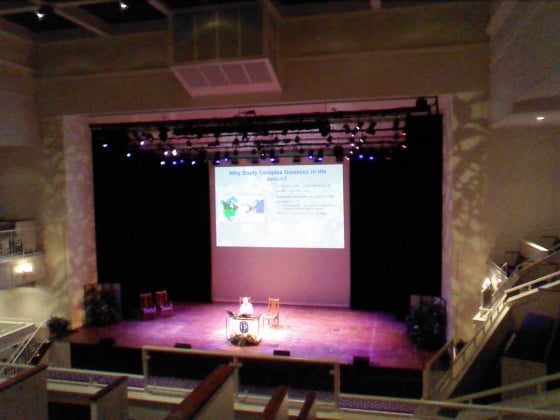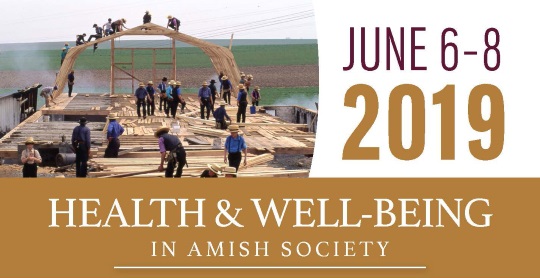2013 Amish Conference: Day Three
I gave my talk on Amish-themed websites this morning. Four main points covered in the talk:
- Many Amish websites have a commercial aspect, even those we might not expect to
- A number of indicators suggest Amish website visitors are more often female and middle-aged
- Searchers find Amish websites via many obscure search terms
- There are likely tens of millions of searches for Amish-related terms each month
Dr. Shuldiner is speaking right now on Amish and genetics:






Hmmmm ...
I had no idea about the middle aged part, but the screen names on Amish America seem to indicate a fairly consistent tilt towards female posters. At least that is what it seems to me.
Especially so when something is being given away for free! (Insert smiley face here)
The conference just wrapped up a few hours ago and now I am kicked back on the Cabela’s easy chair reflecting and listening to the wind chimes on a beautiful afternoon. The other noise I hear is my Amish friend mowing the lawn in the background (I’m not just being lazy; he turned down repeated offers to help). At some point you have to stop talking about technology and get back to using it. Lawns don’t cut themselves after all.
uh-huh ...
(I’m not just being lazy; he turned down repeated offers to help).
That is the EXACT same excuse I use!
I figured that women were a high percentage of readers but not middle aged. By the way, what do you consider middle age? Could it be we who consider ourselves middle aged or older are looking for simpler family oriented lives of our childhood. Maybe we are wishing we had chosen staying home and raising our kids and taking care of our husbands over our careers. There has to be a reason for the preponderance of plain women who are content with their lives compared to worldly women. I know I wish I had chosen differently when I was young. Now in middle age I don’t believe a middle aged or older woman would make it in an Amish community, do you? It is not just the lifestyle but also their church that draws me. Most churches today are like the world and the Amish faith and home church are more Biblical to me. Anyone else feel that way?
Age
Some indicators did not provide a number, just the term middle-aged. Of those that did have a number attached, 45-54 was the most common age range (35-44 and 55-64 also were significant).
I’m not sure there is a consensus on what range actually constitutes “middle age”, but I’m sure middle age is older than it was a few generations ago 🙂
Well, I was wondering ( AND a bit worried ) when you mentioned middle age! I honestly don’t have any idea, anymore, so your information sounds fine to me. But let’s push that 35 up and keep it away from middle age, all right? *laughs*
Now, a question that no one has to answer, of course, but just wondering. Among the “average” Amish group, say, Old Order — at what age does a never-married man or a never-married woman become a “confirmed bachelor” or an “old maid”? Will these individuals truly move from sitting with their peers — the young fathers and mothers — to sitting with the older women during services so as to confirm their “singleness”?
The fictional books I read don’t provide many facts haha.
amish conference
to Debbie H. —–AMEN
Thanks for the daily reports, Erik. I’m looking forward to reading more from your experiences at the conference on Amish America blogs.
I enjoyed reading the abstracts of many of the conference sessions on the Elizabethtown College website. I am still interested in reading many of the papers, so if you learn of any of them available by print, via the internet, etc., please let us know.
Conference talks
I’m working on that now Al. In fact I will have a full talk of one of the presenters (not me 😉 ) posted tomorrow. Some will likely be published in some form in academic journals.
For those interested in an alternative view of how things are in this ongoing struggle between Amish culture and vulture culture, get a copy of “Amish under Siege in America”, published this month by Lambert Academic Publishing Gmbh in Saarbrücken, Germany. It puts the government witch hunt against the Bergholz Amish Church District in historical and social context
Hi Erik,
I’m curious if you spoke at all about how the Amish feel about these websites. My goal is to be a resource for others to find and visit Amish stores and cottage industries in Wisconsin, not to expose them. I’ve been asked several times about this and then question myself even though I always get permission before posting on AIW.
Amish impression of websites
Since it wasn’t a focus of the paper I didn’t dig into that aspect Rose. But I’d expect you’d hear different responses with most either indifferent or leaning positive.
I’d guess the ones that are most negative about Amish websites are probably among the more traditional groups or are non-business owners (this is leaving aside the more offensive, eg Breaking Amish style sites and pages which probably get a thumbs-down from most if not all).
One of the points I made was that many of these sites (not just commercial ones say selling furniture, but blogs and even “institutional” sites–academic sites, museum sites, etc) are monetized in some way.
And in many cases that benefits the Amish as it leads English to purchase Amish products, either online, offline at a bricks and mortar location, or brings English into Amish areas as tourists (tourists are a plus for some Amish).
Late again...
I’d be interested in YOUR speech, Erik. It still seems so amazing to be talking about the Amish in the same breath as “technology”, but things certainly have changed (“evolved” doesn’t sound quite right…)
I’d be interested in learning about Dr. Shuldiner’s talk on the Amish & genetics.
I’m a woman, and (to some) “middle-aged” (more like “beyond”), so I guess I fit in the stats for Amish website visiting. 🙂
Enjoy a brief, though well-deserved rest, Erik (then keep passing on what you’ve learned via this blog, a.s.a.p.!) No pressure, of course. 😉
Thanks!
Alice Mary
Alice Mary I am going to be sharing my talk in full in some form, probably here. Will keep you posted.
Also I have checked with Young Center on archive versions of the livestreamed talks for those that missed them…they are going to let me know.
Archived talks
Thanks for that info, Erik. I really (REALLY) wanted to go to this conference, but wasn’t able to swing it due to family obligations. I actually did not realize they were going to live stream some of the talks; I just noticed that on the Young Center’s website a couple of days ago when I went to see what had been posted about the conference.
One question–was this an annual conference (i.e., held each year with a new focus topic)…or did I just miss a rare event? 🙂 For whatever reason, I thought it was an annual conference though my visit to their site the other day sort of pointed to the latter.
Thanks for the updates either way! Very interesting info.
Amish conferences at E-town
Unfortunately I think you missed a rare event. In 2011 there was the Forgiveness Conference and in 2006 there was the Amish in America conference. I wouldn’t mind if there were something every year.
This is what I worried about! Too bad. I love scholarly conferences on personal high-interest topics. I’m guessing the 2011 conference was a post-Nickel Mines conference. Maybe the Young Center will see there is continued interest and host another next year!
Professionally, I’d actually really be interested in doing study sometime in the future related to language development/disorders in the population (overlaps with my area of research and teaching). There is nothing on the topic out there (e.g., there are only 3 scholarly articles that even mention Amish in my field of study, communication sciences and disorders; only 1 targets the population for the study and it only dealt with congenital hearing issues). I find this interesting (shocking?) given the sheer size of some of the communities and reports of the number of families that do seek services for developmental needs, especially from various larger/more progressive groups (in PA, OH, and IN).
I’ll be sure to share if I hear of any future planned conferences Emily. The topic you suggest would have fit right in at this conference.
Thanks, Erik! I am hopeful that a conference will come around again sometime in the near future. And if that study ever gets off the ground, I will definitely contact you for suggestions on recruitment of participants! 🙂
"Middle-Aged"
“Middle-aged” may be a loaded term, I guess! Erik gave a fine presentation, and I learned a great deal. The demographics, it seems to me, match up fairly closely with the demographics of the average Amish fiction reader.
Marta
I think it is Marta…it is at the least a flexible term and safer than “old-aged” 🙂